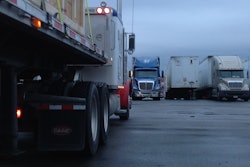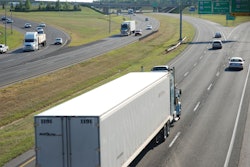Owner-operators paid slightly more overall in income tax for 2018, though their effective tax rate dipped slightly, thanks to new income deductions and equipment depreciation rules. The conclusion comes from analysis of tax returns provided by owner-operator business services provider ATBS.
The firm on Thursday released analysis of its clients’ tax filings for 2018 — the first year under reforms instituted by 2017’s Tax Cuts and Jobs Act. Owner-operators paid just more than $1,000 more on average in income tax in 2018 compared to 2017, but that was due mostly to a major increase in taxable wages.
The effective income tax rate for owner-operator clients of ATBS, the country’s largest owner-operator services firm, dipped by 1.3 percentage points last year, from 19.1% in 2017 to 17.8% for 2018.
Average taxable adjusted gross income of ATBS clients rose from an average of $43,093 in 2017 to $52,180 in 2018 — a 21% jump, reflecting the year’s high freight demand and record-high rates.
Those stronger earnings led to an increase in average tax bills, though at a much lower rate, 12.6%, than the increase in wages. The average tax liability was $8,242 in 2017, $9,284 in 2018.
ATBS’ findings — that owner-operators generally fared better under the new tax code than the prior — is in line with forecasts when the law was passed. Analysts then predicted an average savings of about $2,000 for owner-operators.

ATBS’ figures are based on preliminary data from 3,000 tax returns. ATBS works with about 15,000 owner-operators.
ATBS says two-thirds of its clients took the new Qualified Business Income deduction for 2018. That deduction reduced taxable income by an average $6,325 for its clients, said ATBS. The deduction, which took effect last year under the new tax law, allows pass-through entities (such as LLCs, sole proprietorships and S corporations) to deduct 20 percent of their income from their taxable wages.
Also, the higher standard deduction afforded by the 2017 tax overhaul led ATBS clients to deduct an average of $18,862 — up from $9,439 the year prior. The law doubled the standard deduction for both single filers and married filers, with single filers now afforded a $12,000 deduction and married filers a $24,000 deduction. The law also cut rates in all tax brackets.
Lastly, the new equipment depreciation schedule, which allows owner-operators to deduct the price of equipment in full in the year the buy it, helped cut truckers’ tax liability, according to ATBS analysis. The average depreciation deduction for ATBS clients rose to $20,965, up from $17,072 the year prior.
“The only negative consequence of 2018 taxes was the number of drivers that paid the Affordable Care Act’s individual mandate penalty,” ATBS said Thursday. “In 2018, 28% of ATBS clients paid the penalty with an average penalty amount of $1,027. However, this mandate will no longer be in effect for 2019 taxes.”










